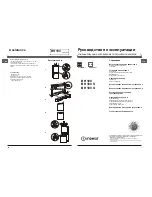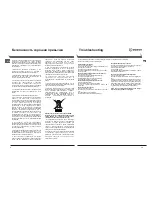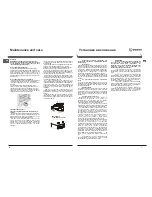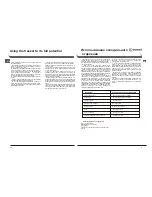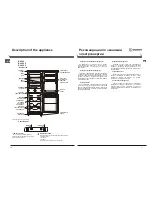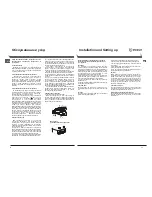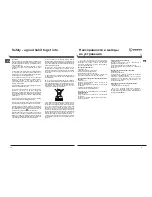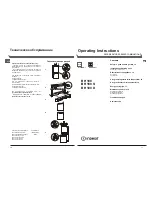
15
GB
Òåõíè÷åñêèå õàðàêòåðèñòèêè
Using the refrigerator to
its full potential
To increase the amount of space, optimize arrangement
and improve appearance, this appliance has a “cooling
area” located within the back panel of the refrigerator
compartment.
When the appliance is operating, this panel may be
covered with frost or droplets of water depending on
whether the compressor is operating or not at a set time.
Do not be concerned about this! The refrigerator is
operating normally.
If the thermo stat knob is positioned on higher settings
while the refrigerator is heavily filled and the ambient
temperature is high, the appliance may run continuously,
resulting in the formation of frost on the back cooling area.
This will lead to an increase in energy consumption.
To avoid this situation, just turn the thermostat knob to a
lower setting so that the appliance defrosts automatically.
-
Within the refrigerator compartment, the air circulates
naturally, with the colder air falling down because it is
heavier. This is the reason why meat and cheeses should
be placed above the vegetable container.
- Please follow our instructions carefully on maximum
storage time: any food, even the freshest, will not remain
edible for any extended amount of time.
- Do not place liquids in containers without covering them
because this will lead to an increase in the level of moisture
within the refrigerator, causing the formation of frost.
- Remember to cool hot food before storing otherwise the
temperature inside the appliance will increase, causing the
compressor to work harder and use more energy.
- Contrary to popular belief, cooked foods are not stored
any longer than raw food.
- The refrigerator compartment is equipped with
convenient, removable shelves which can be adjusted for
height using the shelf guides. This allows you to place even
large containers and foodstuffs in the refrigerator.
- Be careful not to place containers (plastic or glass), food
or other objects in direct contact with the cooling area of the
back wall of the refrigerator. This could harm the food, in-
crease energy consumption and facilitate the formation of
condensate (on food, containers, etc.).
Storing food in the Refrigerator Compartment
Food
Arrangement inside the refrigerator
Fresh fish and meat
Above the fruit and vegetable bins
Fresh cheese
Above the fruit and vegetable bins
Cooked food
On any shelf
On any shelf
Salami, bread loaf, chocolate
Fruit and vegetables
In the fruit and vegetable bins
Eggs
On the shelf provided
On the shelf provided
On the shelf provided
Butter and margarine
Bottles, drinks, milk
CIS
6
Ïðîäóêòû ïðåäíàçíà÷åííûå äëÿ çàìîðàæèâàíèÿ
ñëåäóåò òùàòåëüíî óïàêîâàòü, âî èçáåæàíèå
îáðàçîâàíèÿ èçëèøíåãî èíåÿ. Ïåðåä òåì êàê ïîìåñòèòü
ïðîäóêòû â ìîðîçèëüíèê, îõëàäèòå èõ â õîëîäèëüíèêå.
1. Ïðîäóêòû, ÷àñòè÷íî ðàçìîðîæåííûå, íå ñëåäóåò
ðàçìîðàæèâàòü îêîí÷àòåëüíî: èñïîëüçóéòå èõ äëÿ
ïðèãîòîâëåíèÿ áëþä, êîòîðûå ñëåäóåò óïîòðåáèòü â
òå÷åíèå 24 ÷àñîâ, ëèáî çàìîðîçüòå ïîâòîðíî.
2. Êîãäà çàìîðàæèâàåòå ñâåæèå ïðîäóêòû, íå
äîïóñêàéòå, ÷òîáû îíè êàñàëèñü ðàíåå çàìîðîæåííûõ
ïðîäóêòîâ. Ïðåäïî÷òèòåëüíî, ÷òîáû ïðîäóêòû,
ðàçìåùåííûå âíóòðè ìîðîçèëüíîãî îòäåëåíèÿ, íå
ñîïðèêàñàÿñü ñ çàäíåé è áîêîâûìè ñòåíêàìè. Ïîìíèòå,
÷òî ñîõðàííîñòü ïðîäóêòîâ çàâèñèò îò ñêîðîñòè
çàìîðàæèâàíèÿ.
3. Ñòàðàéòåñü íå îòêðûâàòü äâåðü ìîðîçèëüíîãî
îòäåëåíèÿ âî âðåìÿ çàìîðàæèâàíèÿ.
4. Äëÿ ïðàâèëüíîãî õðàíåíèÿ è ëåãêîñòè ïîñëåäóþùåãî
ð à ç ì î ð à æ è â à í è ÿ ð à ç ì å ù à é ò å ï ð î ä ó ê ò û â
ìîðîçèëüíîì îòäåëåíèè íåáîëüøèìè ïîðöèÿìè; ýòî
ñïîñîáñòâóåò áîëåå áûñòðîìó è íàäåæíîìó
çàìîðàæèâàíèþ. Ðåêîìåíäóåì âåñòè çàïèñè ñ
óêàçàíèåì äàòû çàìîðàæèâàíèÿ.
5.  ñëó÷àå ñáîåâ â ýëåêòðîïèòàíèè íå îòêðûâàéòå
äâåðöó ìîðîçèëüíîãî îòäåëåíèÿ. Ýòî ïîìîæåò ñîõðà-
íèòü òåìïåðàòóðó â ìîðîçèëüíîì îòäåëåíèè íå âûøå
-9Ñ äî 15 ÷àñîâ.
6. Íå ïîìåùàéòå â ìîðîçèëüíîå îòäåëåíèå íà
äëèòåëüíîå âðåìÿ ïîëíûå ñòåêëÿííûå åìêîñòè ñ
çàìåðçàþùèìè æèäêîñòÿìè, îñîáåííî åñëè â íèõ
íàõîäÿòñÿ ïëîòíî çàêóïîðåííûå øèïó÷èå èëè
ãàçèðîâàííûå íàïèòêè. Æèäêîñòü, êðèñòàëëèçóÿñü,
ìîæåò ðàçðóøèòü åìêîñòü.
7. Åñëè òåìïåðàòóðà îêðóæàþùåé ñðåäû â òå÷åíèå
ïðîäîëæèòåëüíîãî âðåìåíè íå ïðåâûøàåò 14°Ñ, òî
òåìïåðàòóðà, íåîáõîäèìàÿ äëÿ õðàíåíèÿ ïðîäóêòîâ, íå
áóäåò äîñòèãíóòà, ÷òî ñîêðàòèò âðåìÿ õðàíåíèÿ
ïðîäóêòîâ.
8.
Åñëè íåîáõîäèìî ïîìåñòèòü íà õðàíåíèå áîëüøîå
êîëè÷åñòâî ïðîäóêòîâ, òî ìîæíî èçâëå÷ü èç
ìîðîçèëüíîé êàìåðû ¸ìêîñòè è õðàíèòü ïðîäóêòû
íåïîñðåäñòâåííî íà ïîëêàõ. Íà âñå ïîëêè, êðîìå
âåðõíåé, ïðîäóêòû äëÿ õðàíåíèÿ ìîæíî êëàñòü òàêèì
îáðàçîì, ÷òîáû îíè âûñòóïàëè çà êðàé ïîëêè íà 20 ìì
äëÿ ìàêñèìàëüíîãî èñïîëüçîâàíèÿ âíóòðåííåãî
ïðîñòðàíñòâà ìîðîçèëüíèêà. Íà âåðõíåé ïîëêå ïðè
ðàñïîëîæåíèè ïðîäóêòîâ äëÿ çàìîðàæèâàíèÿ íóæíî
îðèåíòèðîâàòüñÿ íà ãðàíèöó çàãðóçêè (íà áîêîâîé
ñòåíêå) èëè íà êðàé ïîëêè, åñëè ãðàíèöà íå îáîçíà÷åíà.
Íèæíþþ åìêîñòü âûíèìàòü íå ñëåäóåò, òàê êàê åå
ïðèñóòñòâèå íåîáõîäèìî äëÿ íàäëåæàùåé öèðêóëÿöèè
âîçäóõà.
Èñïîëüçîâàíèå ìîðîçèëüíîãî
îòäåëåíèÿ

